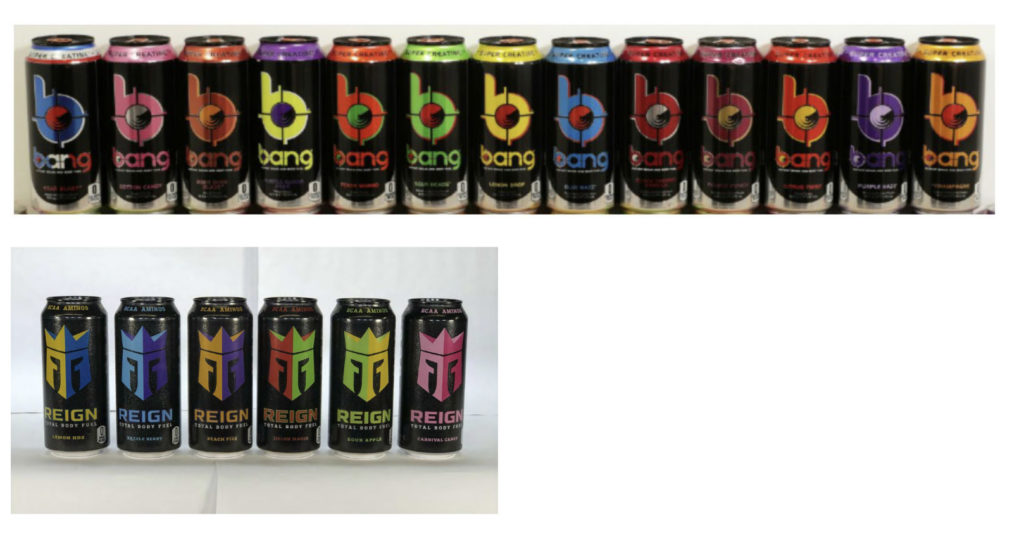“While VPX identified categories of damages and produced financial records, it never presented the required computation of lost sales or loss of goodwill, much less how those damages might be computed.” – Eleventh Circuit

Image taken from court documents
On Wednesday, August 3, the U.S. Court of Appeals for the Eleventh Circuit affirmed a district court’s ruling against Vital Pharmaceuticals, Inc. (VPX) in the form of sanctions for violating its discovery obligations in a trade dress dispute with Monster Energy Company. The Eleventh Circuit also denied Monster’s motion for sanctions in the form of attorney’s fees and double costs.
Trade Dress Complaint
VPX filed a complaint against Monster in 2019 seeking injunctive relief, damages, and disgorgement of profits for trademark and trade dress infringement and unfair competition. Specifically, VPX claimed that Monster’s “Reign” line of energy drinks infringed VPX’s “Bang” drinks, causing a likelihood of confusion among consumers. Ultimately, the district court found in August of 2021, in a 128-page order, that VPX had not established that its trade dress was entitled to protection, that its contention “that Monster had stolen the precise colors Bang had used in its cans—down to the very last shade—in a craven effort to pass its product off as Bang’s…had been totally debunked,” and that Reign’s entry into the market was not likely to cause confusion.
Computation of Damages
In its initial disclosures in May 2019, VPX failed to provide a computation of damages, saying that it needed discovery from Monster in order to do so. Monster subsequently requested more information about “the method and the basis for computing those damages,” and VPX responded that the request was “premature.” It said that information would be divulged via expert reports and testimony and, in the meantime, it provided financial records related to the sale of the Bang products.
However, VPX never produced the expert reports by the deadline, claiming that it missed the deadline due to a docketing error. When it moved for an extension, the district court denied the motion and VPX did not challenge that ruling on appeal. During the deposition of VPX’s CEO, he “evaded nearly all of Monster’s damages-related questions,” and Monster eventually moved to strike VPX’s claim for actual damages due to VPX’s failure to provide any type of calculation. Monster also asked that the court strike VPX’s jury demand because the remaining remedies VPX was requesting were equitable, not legal, and provided no right to a jury trial. While VPX argued the financial records it had provided were sufficient and that expert testimony was not required to establish actual damages, the district court ultimately granted Monster’s motion to strike the claim for actual damages and also struck the jury demand. The court conceded that Monster could have filed a motion to compel instead of seeking sanctions “on the eve of trial” but found that VPX had “entirely failed to disclose its computation of damages as required by Rule 26(a) and (e)” and “had offered no justification for its failure.” The court then ruled against VPX on all of its remaining claims in the August 2021 order.
No Abuse of Discretion
On appeal of the decision to strike the claim for actual damages, as a discovery sanction, the Eleventh Circuit agreed with the district court, explaining that the court did not abuse its discretion, since VPX offered no justification for its failures to comply with discovery obligations and “the mere fact that Monster did not file a motion to compel could not have ‘lull[ed] VPX into believing it had satisfied its burden’ under the circumstances here.” The appellate court added:
While VPX identified categories of damages and produced financial records, it never presented the required computation of lost sales or loss of goodwill, much less how those damages might be computed.
And it still has not. VPX’s briefing simply points in general terms to the parties’ sales and accounting records and the testimony of its corporate representatives. But it fails to explain what Monster (or the district court, for that matter) was supposed to glean from this information, or how Monster could have prepared an effective defense.
Additional Sanctions Denied
Monster also had moved for sanctions against VPX on appeal in the form of attorney’s fees and double costs arguing the appeal was “frivolous”, but the Eleventh Circuit found “a losing appeal is not synonymous with a frivolous one. While it might have ruled against VPX, “the appeal also was not so ‘utterly devoid of merit’ as to warrant sanctions,” and “there were reasonable grounds for good-faith disagreement,” said the court.

![[IPWatchdog Logo]](https://ipwatchdog.com/wp-content/themes/IPWatchdog%20-%202023/assets/images/temp/logo-small@2x.png)

![[Advertisement]](https://ipwatchdog.com/wp-content/uploads/2024/04/UnitedLex-May-2-2024-sidebar-700x500-1.jpg)
![[Advertisement]](https://ipwatchdog.com/wp-content/uploads/2024/04/Artificial-Intelligence-2024-REPLAY-sidebar-700x500-corrected.jpg)
![[Advertisement]](https://ipwatchdog.com/wp-content/uploads/2024/04/Patent-Litigation-Masters-2024-sidebar-700x500-1.jpg)

![[Advertisement]](https://ipwatchdog.com/wp-content/uploads/2021/12/WEBINAR-336-x-280-px.png)
![[Advertisement]](https://ipwatchdog.com/wp-content/uploads/2021/12/2021-Patent-Practice-on-Demand-recorded-Feb-2021-336-x-280.jpg)
![[Advertisement]](https://ipwatchdog.com/wp-content/uploads/2021/12/Ad-4-The-Invent-Patent-System™.png)






Join the Discussion
One comment so far.
C. Whewell
August 5, 2022 08:57 amJack Owoc still owes me for a spec I wrote on the creatine-o-phosphate patent, never paid me a dime for that spec. Karma